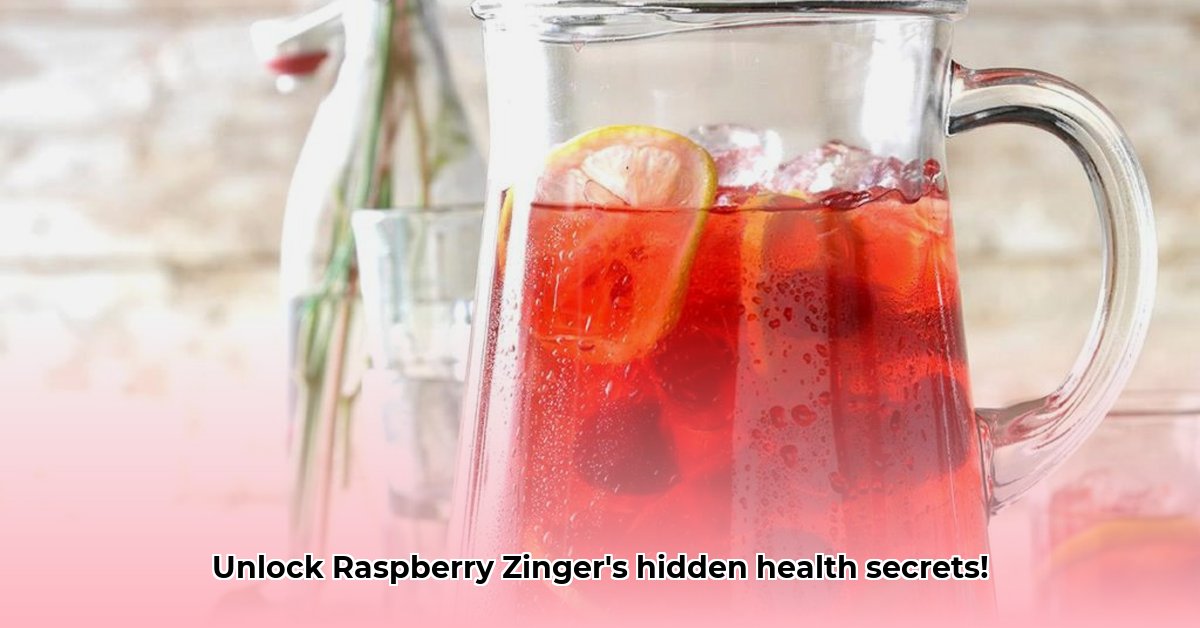
Antioxidant Powerhouse: Your Body's Natural Defense
Raspberry zinger tea, frequently blending raspberries and hibiscus, boasts a significant antioxidant profile. Antioxidants (substances that protect your cells from damage) are abundant in both raspberries and hibiscus. Numerous studies demonstrate their protective effects against cellular damage from free radicals. This antioxidant capacity contributes to overall well-being, acting as a potential shield against oxidative stress. But how potent is this effect in relation to other antioxidant-rich foods? Further research could quantify this protective effect.
Potential Anti-inflammatory Effects: A Promising Area of Research
Inflammation, while a necessary bodily response, can be detrimental in excess. Some components of raspberry zinger tea, particularly those found in red raspberry leaf, might offer anti-inflammatory benefits. However, the supporting evidence remains limited. "While preliminary studies hint at a possible connection, more rigorous and large-scale research is needed to validate these potential anti-inflammatory effects," says Dr. Anya Sharma, PhD, a researcher specializing in herbal medicine at the University of California, Berkeley.
Claims Requiring Further Research: Separating Fact from Fiction
Many claims surrounding raspberry zinger tea lack conclusive scientific support. While anecdotal reports abound, robust evidence is missing.
Fertility: No Proven Link
The notion that raspberry zinger tea enhances fertility lacks substantial scientific backing. While some individual components may support general reproductive health, there's no direct evidence establishing it as a fertility booster. "Currently, there's no scientific evidence to support the claim that raspberry zinger tea improves fertility," states Dr. Emily Carter, MD, OB/GYN at Johns Hopkins Medicine.
Labor and Delivery: Mixed Evidence
The traditional use of red raspberry leaf tea to ease labor remains controversial. Small studies suggest a potential for slightly reduced labor duration, but larger-scale trials are needed for confirmation. "Existing research is insufficient to recommend red raspberry leaf tea for labor induction or shortening," cautions Dr. Sarah Miller, MD, a family physician at the Mayo Clinic.
Weight Loss: A Misconception
There is no scientific evidence to support the claim that raspberry zinger tea aids in weight loss. Weight management hinges on a balanced diet and regular exercise. Attributing weight loss solely to tea consumption is misleading.
Ingredient Variations: A Complex Conundrum
The composition of "raspberry zinger tea" varies widely among brands. This inconsistency makes it difficult to assess its health effects conclusively. Different blends contain varying concentrations of raspberries, hibiscus, and other ingredients, leading to inconsistencies in potential benefits.
Conclusion: A Balanced Perspective
Raspberry zinger tea, while potentially offering some benefits like antioxidant protection (due to its components), requires further research to substantiate many of its claimed advantages. While it's a pleasant beverage, we must avoid overstated claims. A healthy lifestyle encompassing a balanced diet and regular exercise remains crucial for overall well-being. Always consult your healthcare provider before using raspberry zinger tea, especially during pregnancy.
Key Takeaways:
- Raspberry zinger tea is rich in antioxidants, potentially offering cellular protection.
- Claims related to fertility, labor induction, and weight loss lack robust scientific evidence.
- Ingredient variations across brands significantly impact the analysis of the tea's health benefits.
- Consult a healthcare professional before using this tea, particularly during pregnancy.